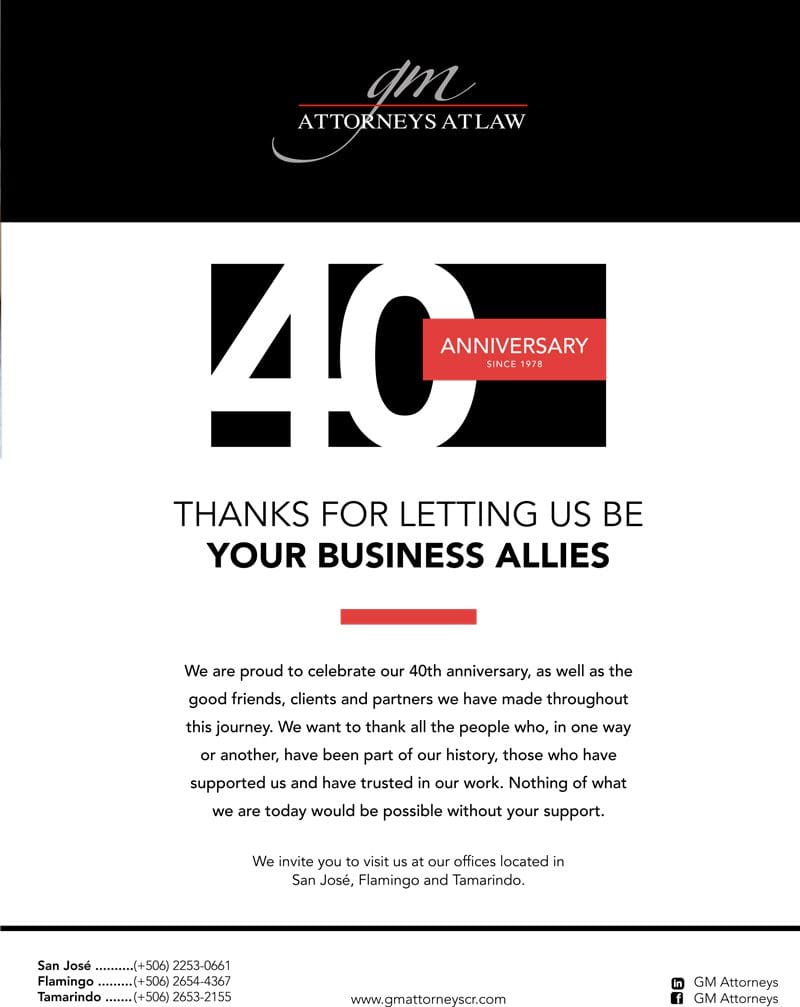
Rental Properties
With the substantial number of rental properties in Costa Rica, it is important for owners who rent their properties out to be aware of, and be reminded of, legal changes that were effective in 2018. In addition, changes to the Ley de Fortalecimiento de las Finanzas Públicas (Law #9635) came into effect in 2019.
Per the resolution N° DGT-R-012-2018, the CR tax authorities established the mandatory use of the electronic invoice system for all taxpayers, including real estate rentals, starting September 1st 2018. Non-compliant rental property owners are subject to a penalty and fines.
Before the approval of the Law #9635, the applicable income tax was calculated on the company’s annual profit: income, less expenses, within the fiscal year. These income taxes were filed annually through a D-101 form and long-term rentals were not taxed with Value Added Tax (VAT).
With approval of the Law #9635, income tax on rental properties will now be filed monthly through a D-125 form. The law allows that:
- 15% of expenses from the rental income can be without proof.
- This creates a tax base of 85% from the rental income.
- The tax rate is 15% of the tax base (85% of rental income).
Residential rentals will be taxed 13% VAT if the rent amount exceeds 1.5 the average Costa Rica base salary income (around USD $1,085). Any commercial leases are subject to the VAT regardless of the amount of the monthly rent.
Monthly, property owners must withhold, file and pay VAT using the D-104 tax form: 13% of the rental income paid by the renter. Also monthly, the owners must file and pay income tax via form D-125 tax as outlined above. For example:
- Renter pays $2,000 USD for rental, plus 13% VAT = $260
- Expenses allowed by law 15% of rental income = $300
- Tax base = $1,700
- Income tax to be paid = $255 ($1,700 x 15%)
Employer requirements
There is one exception that will allow taxpayers to continue annual tax filing (form D-101). They must have an employee on the payroll that is duly registered in both Caja Costarricense de Seguro Social (CCSS, or social security) and Instituto Nacional de Seguros” (INS, or workers compensation insurance). This can be evaluated in each case due to the labor liabilities.
These obligations relating to legal employees are worth mentioning:
- Associated payroll taxes are around 28% of the employee’s gross salary.
- Workers compensation is, on average, 2% depending on the job description.
- The Christmas bonus — Aguinaldo — is mandatory on an annual basis. It is 1/12th of the total gross salary.
- Two weeks paid vacation is also mandatory
The list above covers very basic payroll requirements. A registration form, including copies of the employee’s ID, must be submitted within eight days of hiring a new employee to avoid fines and penalties before CCSS and INS.
It is highly advisable to have a written labor agreement that details salary, hours, work description and all other relevant matters.
It is important to fully understand the tax and labor laws relating to renting property and hiring personnel for a rental property, such as a maid, housekeeper or maintenance person. For assistance, we are at your service at info@gmattorneyscr.com
See this article in the international digital magazine, click here
Enjoy the audiovisual story – CLICK HERE!

